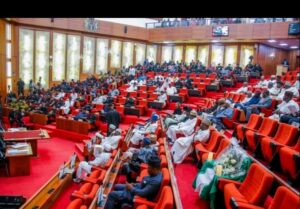Senate Retains 7.5% VAT in Tax Reform Bill, Approves New Revenue Sharing Formula, Funding for Key Agencies
 The Nigerian Senate Committee on Finance has recommended the retention of the current 7.5% Value Added Tax (VAT) rate under the federal government’s Tax Reform Bills, while introducing a new sharing formula for VAT revenue that prioritizes fairness, demography, and economic activity.
The Nigerian Senate Committee on Finance has recommended the retention of the current 7.5% Value Added Tax (VAT) rate under the federal government’s Tax Reform Bills, while introducing a new sharing formula for VAT revenue that prioritizes fairness, demography, and economic activity.
This recommendation, which forms part of ongoing legislative efforts to overhaul the nation’s tax architecture, was presented during a committee session in Abuja on Tuesday, May 6, 2025.
It follows extensive consultations with fiscal policy experts, stakeholders from the Federal Inland Revenue Service (FIRS), and the Presidential Committee on Fiscal Policy and Tax Reforms.
Under the newly proposed sharing formula, VAT proceeds will be distributed among the three tiers of government as follows: 50% of VAT collections to be shared equally among all states and the Federal Capital Territory (FCT), 20% to be shared based on the population size of each state, and 30% to be distributed based on actual consumption levels recorded per state.
This marks a shift from the previous sharing formula which leaned more heavily on equal distribution and less on economic contribution. According to the Chairman of the Senate Committee on Finance, Senator Sani Musa (APC, Niger East), the formula aims to promote equity, stimulate internal revenue generation, and reward economic performance.
“We must begin to incentivize states that drive consumption and encourage production. At the same time, we are mindful of the need to support less populous or economically disadvantaged regions.”
Contrary to calls from some quarters for either a reduction or an increase in the VAT rate, the Committee maintained that the existing 7.5% is appropriate for the current economic realities. This rate was initially introduced in February 2020 under the Finance Act 2019, rising from the previous 5%.
The Committee noted that raising the VAT rate further could worsen inflation and burden low-income households, while a reduction would shrink government revenue at a time when Nigeria is grappling with fiscal deficits.
In addition to the VAT reforms, the Senate has also approved the continued statutory funding of key federal agencies critical to Nigeria’s development goals.
The Tertiary Education Trust Fund (TETFUND) will continue to receive funding from education-related levies to support infrastructure and academic research in higher institutions.
The National Agency for Science and Engineering Infrastructure (NASENI) will be empowered to drive local production of industrial and engineering solutions.
The National Information Technology Development Agency (NITDA) will retain its funding structure to support digital innovation and ICT infrastructure across the country.
These provisions align with President Bola Tinubu’s economic transformation agenda and the recommendations of the Presidential Fiscal Policy and Tax Reforms Committee chaired by Taiwo Oyedele.
Analysts have lauded the move as a balanced approach to fiscal federalism. Speaking to The Guardian, tax analyst Chinenye Okeke noted: “This formula encourages states to broaden their economic base and promote consumption, but the equal-sharing component ensures smaller states are not left behind.”
However, concerns remain about the administrative capacity of state governments to track consumption accurately and ensure transparency in how funds are utilized.
The Tax Reform Bills are expected to proceed to the plenary for debate and passage before the end of Q2 2025. Once passed, they will form a major pillar in the federal government’s drive to diversify revenue sources and reduce overdependence on oil receipts.







